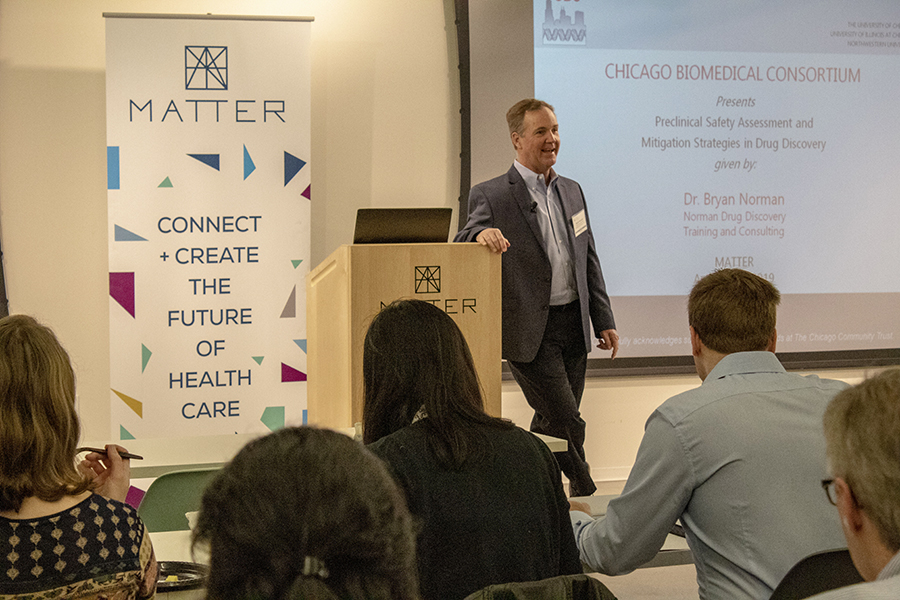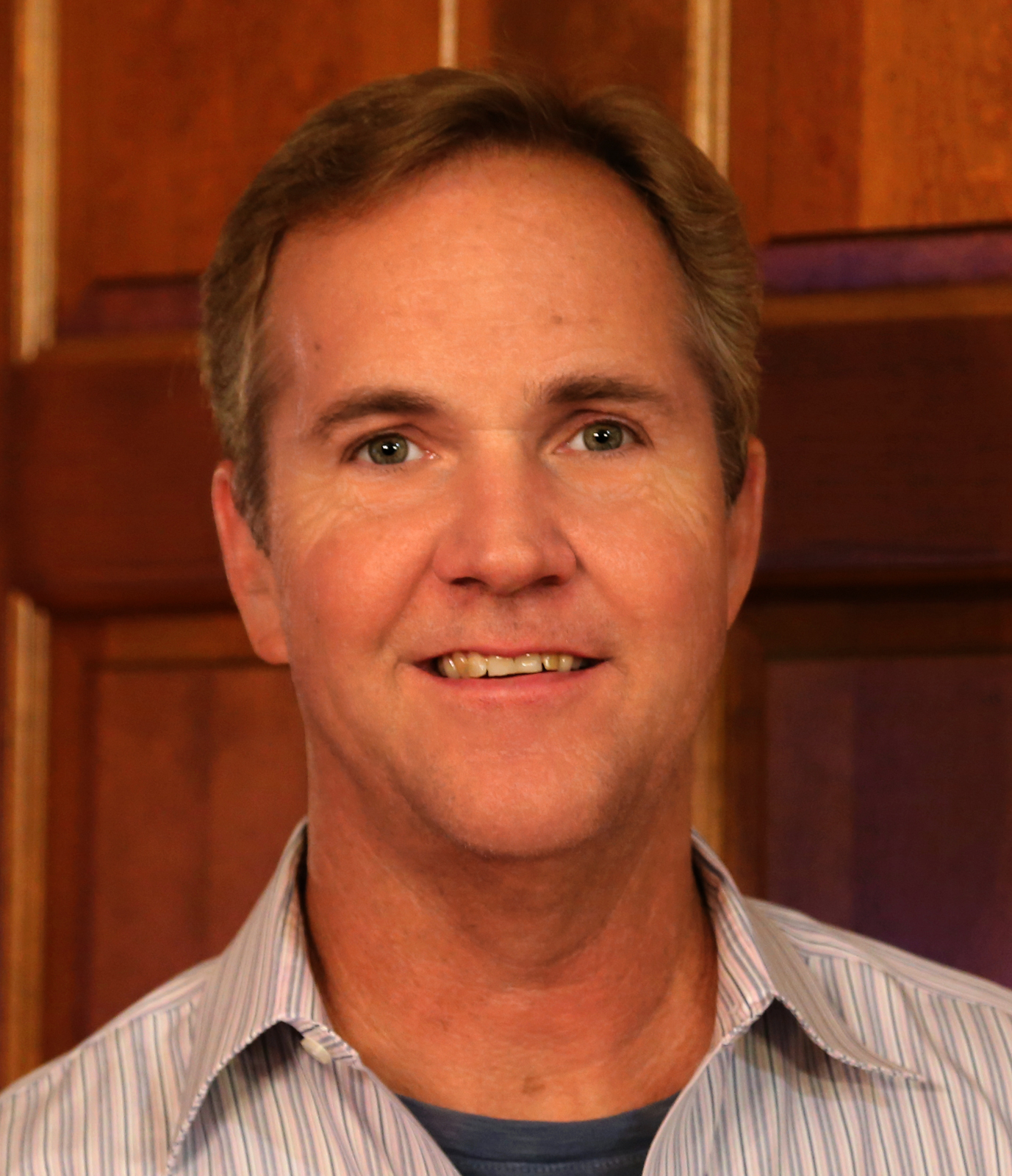April 182, 2019 | Karen Snapp
A CBC-sponsored course, “Preclinical Safety Assessment and Mitigation Strategies in Drug Discovery” with Dr. Bryan Norman, received with enthusiasm

Dr. Bryan Norman, Norman Drug Discovery Training and Consulting, leading a day-and-a-half CBC-hosted workshop for “Preclinical Safety Assessment and Mitigation Strategies in Drug Discovery” at MATTER, April 9-10, 2019.
The Chicago Biomedical Consortium (CBC) hosted a day-and-a-half workshop for “Preclinical Safety Assessment and Mitigation Strategies in Drug Discovery” with Dr. Bryan Norman, Norman Drug Discovery Training and Consulting, at MATTER on April 9-10.
As a hub for innovators aspiring to solve healthcare problems the right way, MATTER was an ideal location for this kind of educational event, and the CBC was pleased to present this opportunity for community members to learn and to interconnect with each other.
The large auditorium at MATTER was filled with scientists and managers who work in the cross functional planning and execution of drug discovery programs and those who hope to do so in the future. Medicinal chemists, toxicologists, biologists, pharmacologists, pharmacokineticists and program managers all gained valuable insights into modern preclinical safety assessment strategies. All three CBC institutions, including University of Illinois at Chicago, Northwestern and University of Chicago, were well represented and many Accelerator Award applicants and award winners gained knowledge from Dr. Norman’s detailed presentation during the course. The sessions were highly interactive, with numerous questions and lively dialog from the audience.
With over 20 years of experience in drug discovery at Eli Lilly, Dr. Norman shared his expertise while covering many of the most common risks and modern mitigation strategies. For example, he discussed how drug discovery teams navigate an optimization effort geared to delivering safe and well tolerated potential new therapies in the shortest time possible. He also described some of the common pitfalls in toxicological data interpretation and how to best use the data to inform a lead optimization strategy and ultimate clinical study design.
Course Content Highlights include:
- Principles of safety assessment in drug discovery.
- The Investigational New Drug (IND) application and indication-specific preclinical safety data to support the FHD.
- Target safety assessment, predictive toxicology, in silico methods, high content assays.
- Toxicology Risks and Flow Scheme Design.
- Risk reduction strategies and factors that influence study design.
- Toxicology study design.
- Common off-target safety concerns and mitigation.
- Managing on-target safety concerns.
- Pharmacokinetics in preclinical safety assessment.
- Preferred drug properties to minimize toxicological risks.
- Chemistry of drug metabolism.
- Toxicophores and structure alerts.
- Potential to avoid adverse drug reactions.
- Mechanisms and mitigation strategies for Drug Induced Liver Injury (DILI).
- Clinical Candidate selection.
- Designing GLP studies.
- Preclinical safety biomarkers and translation to humans.
- Strategies for accelerating development milestones.
- Safety assessment studies to support late stage clinical development.
The CBC provided breakfast and lunch and hosted a networking reception at MATTER, allowing attendees to meet other members of the CBC community. Not only did attendees engage in lively discussions with each other at the reception, they also took advantage of the opportunity to be at MATTER and went on impromptu tours of the collaborative and cutting-edge space.
Enjoy the photo-gallery from the workshop!
 Bryan H. Norman received his Ph.D. at Emory University and was an NIH Postdoctoral Fellow at Penn State University. After three years at Monsanto/Searle, Bryan joined Eli Lilly and Company in 1993, where he led multiple cross functional drug discovery efforts, many of which culminated in clinical candidates for endocrine and pain indications. In addition to his expertise in medicinal chemistry, Bryan has significant cross functional drug discovery experience and expertise in additional disciplines, such as biomarkers, pharmacokinetic/pharmacodynamic (PK/PD) relationships, mechanisms of drug metabolism and toxicology. He has specific expertise in the mechanisms and mitigation strategies to avoid drug-induced liver injury (DILI). The breadth of his background has led to his service on many Due Diligence teams to assess potential in-license opportunities. Bryan retired from Eli Lilly and Company in 2018 and currently works as Independent Consultant/Instructor. In addition, he is a Volume Editor and serves on the Editorial Board of Burger’s Medicinal Chemistry, Drug Discovery and Development and is currently on the Board of Directors of the Medicinal and Bioorganic Chemistry Foundation. Bryan has published over 45 papers in peer-reviewed scientific journals and given many invited lectures at scientific conferences and universities. His most recent research interests have focused on the discovery of novel analgesic agents for use in chronic pain.
Bryan H. Norman received his Ph.D. at Emory University and was an NIH Postdoctoral Fellow at Penn State University. After three years at Monsanto/Searle, Bryan joined Eli Lilly and Company in 1993, where he led multiple cross functional drug discovery efforts, many of which culminated in clinical candidates for endocrine and pain indications. In addition to his expertise in medicinal chemistry, Bryan has significant cross functional drug discovery experience and expertise in additional disciplines, such as biomarkers, pharmacokinetic/pharmacodynamic (PK/PD) relationships, mechanisms of drug metabolism and toxicology. He has specific expertise in the mechanisms and mitigation strategies to avoid drug-induced liver injury (DILI). The breadth of his background has led to his service on many Due Diligence teams to assess potential in-license opportunities. Bryan retired from Eli Lilly and Company in 2018 and currently works as Independent Consultant/Instructor. In addition, he is a Volume Editor and serves on the Editorial Board of Burger’s Medicinal Chemistry, Drug Discovery and Development and is currently on the Board of Directors of the Medicinal and Bioorganic Chemistry Foundation. Bryan has published over 45 papers in peer-reviewed scientific journals and given many invited lectures at scientific conferences and universities. His most recent research interests have focused on the discovery of novel analgesic agents for use in chronic pain.
See more:
